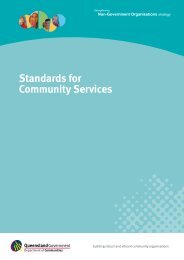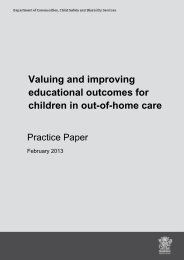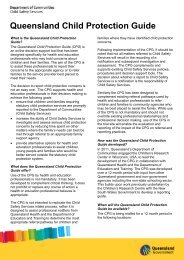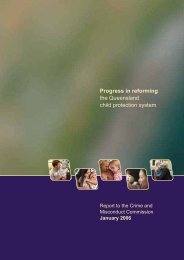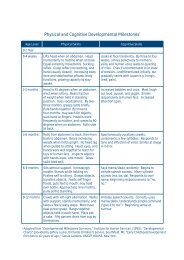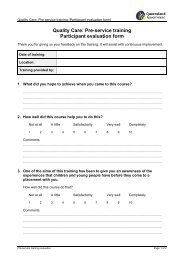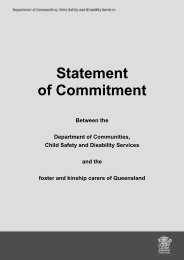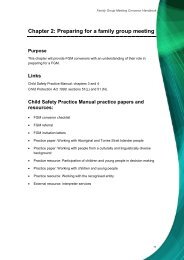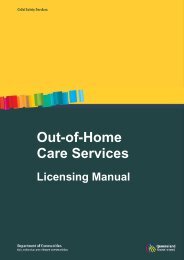Housing and Support Program (HASP): Final Evaluation Report
Housing and Support Program (HASP): Final Evaluation Report
Housing and Support Program (HASP): Final Evaluation Report
Create successful ePaper yourself
Turn your PDF publications into a flip-book with our unique Google optimized e-Paper software.
1.2 <strong>Housing</strong> <strong>and</strong> supports –<br />
previous research<br />
In Australia, the inclusion of psychiatric disability<br />
in the Commonwealth Disability Services Act 1986<br />
brought into focus the distinction between illness<br />
<strong>and</strong> disability. It was noted that illness should be<br />
the domain of clinical interventions, while the<br />
disability component should become the concern<br />
of those skilled in the management of disability.<br />
Whiteford (1994, p.343) argues that no single agency<br />
should take complete responsibility for the lives<br />
of people with mental illness (as mental health has<br />
historically done). Whiteford outlined several reasons<br />
for this:<br />
access to social <strong>and</strong> disability programs available<br />
to people with other disabilities should be available<br />
to people with a mental disability. This is in keeping<br />
with equitable access <strong>and</strong> non-discrimination in<br />
service provision;<br />
mental health professionals can specialise in the<br />
provision of treatment <strong>and</strong> rehabilitation rather than<br />
the provision of services that can be provided more<br />
effectively or effi ciently by other agencies;<br />
mainstreaming people with mental illness into<br />
current social <strong>and</strong> disability services is likely<br />
to decrease marginalisation <strong>and</strong> stigmatisation;<br />
no single agency (including mental health) would<br />
have suffi cient resources to meet the broad range of<br />
services required by people with a mental disability.<br />
Thus disability support is provided on some<br />
assumptions about the desirability of moving care<br />
<strong>and</strong> treatment away from a focus on clinical concerns<br />
towards a broader community approach. The<br />
research evidence supporting greater involvement<br />
of the disability sector is increasing. Indeed, in<br />
Australia, funding provided to the non-government<br />
sector to support people with psychiatric disability<br />
has increased by 294% or $75 million since 1993<br />
(Commonwealth Department of Health <strong>and</strong> Ageing,<br />
2004).<br />
1.2.1 Services provided by disability support workers<br />
<strong>Support</strong> agencies work in collaboration with mainstream<br />
mental health services <strong>and</strong> tend to target people at<br />
the more severe end of the spectrum. They assist<br />
people to connect to mainstream social <strong>and</strong> disability<br />
services by linking them to community-based recreation<br />
<strong>and</strong> vocational services (Walter & Petr, 2006). While<br />
different models of disability support have developed,<br />
the interventions provided seem to be common across<br />
models. Warner <strong>and</strong> colleagues (1998) collected<br />
information on the services provided by support staff<br />
in a number of different support programs in the UK<br />
<strong>and</strong> Northern Irel<strong>and</strong> <strong>and</strong> found that service provision<br />
could be categorised into three domains — assisting<br />
clients ‘within the home’, ‘outside the home’, <strong>and</strong><br />
‘liaising’ on behalf of clients (Warner et al., 1998).<br />
Services offered within the home were classifi ed<br />
as being emotional or practical in nature, while those<br />
provided outside the home were classifi ed as social,<br />
practical <strong>and</strong> leisure based (Table 1.2.1).<br />
<strong>Housing</strong> <strong>and</strong> <strong>Support</strong> <strong>Program</strong> (<strong>HASP</strong>)<br />
5



